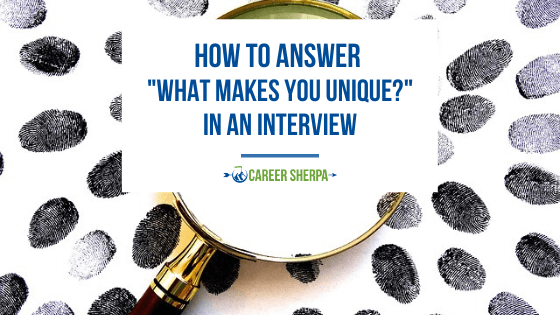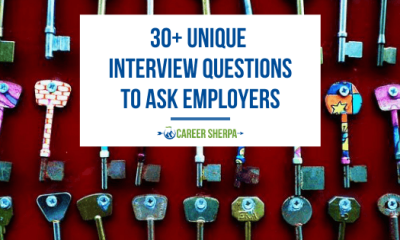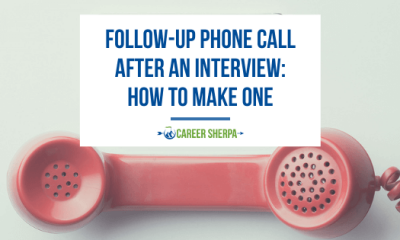Job
How To Answer “What Makes You Unique?” In An Interview


“What makes you unique?” is a question that many interviewers like to use. But due to its perceived simplicity, many applicants are woefully underprepared when they attempt to answer it!



This article will teach you how to answer “What makes you unique?” in a way that highlights your abilities and improves your chance of getting the job.
The Reason Interviewers Ask This Question
Like many other personality questions, “What makes you unique?” is multifaceted. How you respond to an interview question like this tells the interviewer and hiring manager a lot about who you are and what you can bring to the table.
Of course, interviewers ask this question because they genuinely want to know what you think sets you apart from other potential candidates.
The interviewer wants to know the qualities that make you stand out. Multiple people are likely up for the same role you’re trying to get. Not only that, but many applicants have the same qualifications as you!
So, what makes you unique, and why should the company choose you above everyone else?
Your resume already paints a good picture of your capabilities. But there are many things your resume can’t say. The interviewer wants to hear them!
It’s your opportunity to talk about your soft skills and other capabilities that will help you do well in this role. Your response can also help key decision-makers determine if you’re a good overall fit for the company culture.
But that’s not all. “What makes you unique?” also helps interviewers understand what you value most about yourself. It’s about figuring out your critical strengths and seeing what’s important to you in the workplace.
Most people will respond with the attributes they’re most proud of or actively working on, giving hiring managers valuable insight into your overall attitude.
How to Answer “What Makes You Unique”
Figuring out how to answer “What makes you unique?” isn’t as easy as it sounds. That’s the point! Personality-based questions often catch job applicants off guard, letting interviewers see how you handle pressure and adjust to the unknown.
There’s no universally correct answer. However, the key to success is to mold your answer around the job and shine yourself in the best light possible.
Here are a few tips to help you do just that.
1. Go Over Your Work History and Accomplishments
The best approach when answering “What makes you unique?” is to start by looking over your work history. Think about your accomplishments in previous jobs and what led you to this point. A bit of self-reflection goes a long way in questions like this.
Focus on the traits and strengths that helped you succeed. The best way to leave an impact is to discuss why you reached the level of success and what skills you used to get there.
For example, say that you won an award for making the most sales or retaining the most extensive client base at your previous job. Instead of only talking about that, mention how specific situations made a difference. Maybe you restored lost accounts by quickly addressing an unhappy client’s concerns and regained their trust. And by all means, include numbers or percentages – sales quota, value of clients saved or business acquired.
Details matter. Try to point to actual events in your work history to illustrate the skills and attributes you want to highlight. It’s one thing to say that you’re good at something, but it’s another to show why.
Always provide examples when possible, and don’t be afraid to dig deep into your work history. Your past is the best source of inspiration for a question like this. So, self-assess and tell a story that shows the interviewer why you are a must-hire. Remember the STAR interview technique.
2. Research the Company
Before you even head into your interview, researching the company is paramount. If there’s one piece of advice you should follow, it’s to come into the interview prepared. You need to know as much as you can about the organization and the position as possible.
Your research will provide valuable information to answer questions like this and more. Plus, it makes you look prepared, well-informed, and genuinely interested in getting the job.
Understanding the company’s culture and overall mission can guide you in the right direction. Figure out what the company needs and explain what makes you unique in ways that can help them. For example, the organization could be looking to expand into new markets or find a new approach to generate more sales.
Whatever the case, think about how you can contribute to the bottom line. Connect the dots and determine why you would be a valuable asset to them. Talk about it and always stress the positive traits or needed skills that can make a difference in the organization.
3. Think About What the Interviewer is Looking For
Another goal of your research here is to determine what the employer finds valuable. Examine the job description closely and determine the skills and abilities the hiring manager wants to see. Do a little digging and check out what existing employees can do. If possible, send one of them an email for some better insight.
A good approach is to connect your answer with the information you find. For example, maybe the job requires innovation and a fresh perspective. In that case, you can talk about your unique ability to think out of the box and provide creative solutions to workplace challenges.
It’s not about lying or bending the truth. Your goal is to find the job’s most critical attributes and show that you have them!
4. Connect Your Answers to the Role
As you would expect, your answer to “What makes you unique?” should always connect back to the job at hand. With a question like this, it’s easy to get off-topic and veer into broader discussions. Resist that urge and stay focused on your ultimate goal: Landing the job.
You’re free to dig deep into your past and even talk about your grander goals. However, always find ways to tie your unique traits back to the job. Review your strengths, look at the job description, and use your words to establish that connection.
Once you successfully tie everything in, it’s not difficult for the interviewer to see why you would be a good fit for the job. Use the role as inspiration while self-reflecting and finding ways to tie everything neatly into one response.
5. Rehearse
Our last tip is an important one: Rehearse! Practice makes perfect, and you’ll want to rehearse your answer to “What makes you unique?” a few times before the interview.
It’s not necessarily a good idea to write and memorize a script verbatim. Doing that would make you sound robotic and inauthentic. You still want a bit of openness and adaptability.
However, having a response prepared can make all the difference. Try to focus on the key points you want to bring up and find ways to talk about them comfortably. The more you practice, the easier it’ll be to discuss your strengths.
It becomes less daunting, and that confidence will come off well during your interview.
What to Avoid Saying
Now that you know how to form an impressive answer and explain what makes you unique, let’s talk about what you shouldn’t say. There’s no universally correct answer, and everyone’s response will differ. However, that doesn’t mean you can’t say something that’ll turn the interviewer off and hurt your chances of getting hired.
Here are a few red flags you want to avoid when answering this question.
Generic and Vague Answers
Your first instinct might be to provide a rather generic answer. For example, you might see that the job description says it requires research. So, your response is, ” What makes me unique is that I’m good at research.”
Sounds simple enough, right?
Unfortunately, short and boring answers like that aren’t doing the question justice. It doesn’t tell the interviewer anything they want to know. You can include your research abilities in your resume, so it’s a redundant answer as well.
A generic answer does nothing to show why you’re a top-notch candidate. You need to go into detail and illustrate why you should get the job over others.
Rambling Answers
Short answers aren’t great, but neither are super long ones! Believe it or not, this common mistake often happens without the applicant realizing it.
As we mentioned earlier, questions like this can throw people off. It seems simple, but many are unprepared when it comes.
So what do they do?
They start speaking with no clear message in mind. That often results in people talking in circles until they land on something that resembles a decent-sounding answer. It’s the equivalent of throwing everything you can at the wall and hoping something sticks.
Of course, the interviewer isn’t impressed by those answers. It’s obvious when someone is unprepared and begins speaking to fill space.
Overly Personal or Irrelevant Details
Despite how it sounds, when an interviewer asks what makes you unique, they aren’t interested in learning oddball trivia about you or your past. No matter how cool some of those facts might sound, they’re irrelevant to the situation.
Remember: This is a job interview. There’s no reason to talk about quirky experiences or topics that have nothing to do with work or your job history.
Avoid those superfluous details and stick to the end goal. Provide clear and concise answers. You want to sound put-together and prepared, so leave the weird responses out.
Lies & Falsehoods
Always stick to the facts.
It’s tempting to stretch the truth a bit. When caught off guard and wanting to look your best, you might exaggerate a little or say flat-out lies.
Make no mistake: The truth will come out at some point (that’s why it made our list of crucial interview do’s and don’ts). Hiring managers will speak to references, and those tall tales can be discussed.
Lying will hurt your chances of getting the job. No one wants to hire someone who lies during an interview. If you lie in the job interview, what’s stopping you from lying later?
Be honest and take time to come up with genuine answers. Bring up real-world examples and be truthful about your capabilities.
Bash Other Candidates
Finally, don’t structure your answer to “What makes you unique?” in a way that talks negatively about other job hopefuls. That’s not the goal of this query, and being super negative about other applicants can make you look petty and unprofessional.
Focus on yourself instead.
Best Sample Answers
Creating a response to this question requires careful thought and consideration. You have to pull from your past and reflect on your capabilities. As a result, every answer is unique.
What’s right for you might not be the correct answer for someone else. While you can’t copy a response from someone else, you can use good examples as inspiration.
Example 1
In our first sample answer, the applicant provides a concise response that perfectly highlights the trait they value most in themselves. The job-seeker knows that this position is ever-evolving and understands that the employer wants someone adaptable and unafraid of challenges. So, the applicant chooses to highlight their ability to learn new things.
“What makes me unique is that I’m always seeking new opportunities to learn. I’m not particularly eager to rest on my laurels and prefer pushing my capabilities whenever possible.
In my last job, we adopted a new system and software to manage customer relations. Because it was so new, most of my colleagues had difficulty adjusting. I took the time to learn the platform inside and out, eventually becoming the go-to person for questions and assistance.”
Example 2
Our next example focuses on organization. Many jobs require good time management and general organizational skills. In this case, the applicant pulls from their experience as an administrative assistant to show how their capabilities directly benefited their previous employer.
“I pride myself on my natural organizational skills. As an administrative assistant, I did everything possible to keep the office chaos-free and running smoothly. I did that by reorganizing files and maintaining a well-organized supply closet.
Because supplies were easier to find, we experienced much less waste and reduced extraneous purchases. We saved about 25 percent on office supply orders in the following years.”
Example 3
In this final example, the applicant is trying to illustrate their impeccable research skills. Instead of providing a generic answer, the job-seeker paints a picture of how passionate they are about doing solid research.
Not only does this answer tell a story about past work experience, but it also highlights how their mind works outside the office.
“What makes me unique is my ability to apply effective research protocols. In my previous job, I received positive feedback on my consistency and thoroughness when working on research-heavy projects.
But even outside of work, I tend to apply a research-minded approach to everything I do. I’m passionate about current events and often use a methodical approach when taking notes about current policy and government changes.”
Conclusion
Now that you know how to answer “What makes you unique?” it’s all about putting in the appropriate amount of practice time.
Once you think about your answer and rehearse it, you’ll see this question as an opportunity instead of an obstacle.



Hannah Morgan speaks and writes about job search and career strategies. She founded CareerSherpa.net to educate professionals on how to maneuver through today’s job search process. Hannah was nominated as a LinkedIn Top Voice in Job Search and Careers and is a regular contributor to US News & World Report. She has been quoted by media outlets, including Forbes, USA Today, Money Magazine, Huffington Post, as well as many other publications. She is also author of The Infographic Resume and co-author of Social Networking for Business Success.
#Answer #Unique #Interview


















